WTEA Presidents’ Forum 2023 Held at Guilin
On the afternoon of October 28, WTEA Presidents’ Forum 2023 was held at Guilin Waterfall Hotel as part of Guilin Festival. The forum, initiated by Prof. Hao Rong, President of the CAD and Secretary General of WTEA, was themed as ‘Towards A Native School of Acting’. Six heads of WTEA member schools from China, Georgia, Germany, Greece, Russia, and the USA attended the forum and shared their insights into this pertinent topic of common concern, which is both of historical significance and practical value.
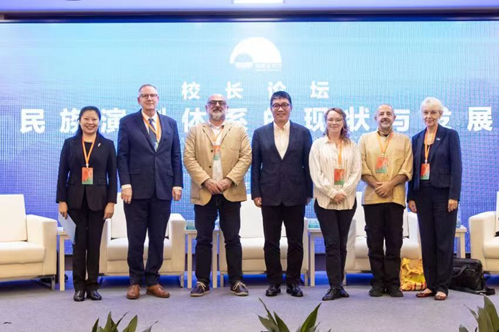
The Speakers
Ms Ju Ping, Director of Foreign Affairs Office at the CAD, hosted the forum, while Prof. Chen Min, Vice Director of Department of Theatrology, served as the moderator.
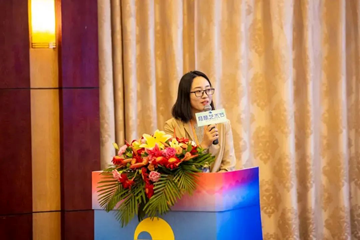
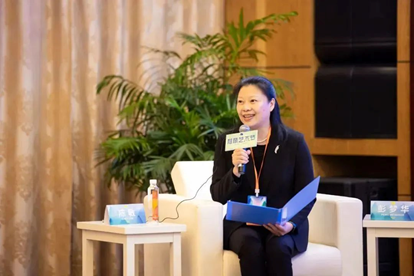
Ms Ju Ping Prof. Chen Min
Prof.Hao Rong, in his speech, mentioned that though theatre originated in ancient Greece, the diverse cultural expressions in different countries had rendered a vibrant panorama in artistic creation after 2500 years of development, that the reflection on theatre by various nations exhibited non-conformity. Simultaneously, despite the global recognition of Stanislavski's system as a classic, many other acting systems and creative methods have been born and widely disseminated. With the trend of international exchange and learning, the intention is to sinicize Western drama theories triggered the construction of a native Chinese school of acting. He brought up Mr. Ouyang Yuqian, the founding father of the Central Academy of Drama, and one of the pioneers of contemporary Chinese drama. Mr. Ouyang explicitly proposed the idea of learning from traditional theatrical art forms, incorporating Stanislavski's acting system to form an acting method for Chinese drama. “We must, based on learning from the theatrical concepts and theories of our predecessors, better integrate the theatrical cultural ideas and practical experiences of various countries. This should then be applied to the Chinese theatre and acting system,” Prof. Hao reiterated.

Prof. Hao Rong
Prof. George Shalutashvili, Rector of Shota Rustaveli Theatre and Film Georgia State University from Georgia, emphasized the significance of the neural cognitive mechanism known as ‘mirror neurons’ in the training of actors. He put forward that the integration of science and drama was a growing trend for theatrical development. According to scientific research, the function of neurons is to reflect the behaviour of others, enabling individuals to progress from simple imitation to more complex forms. Language, music, and art are developed on this basis. Drama relies strongly on imitation, and actors, while observing others to understand their emotions and to empathize with them, need neurons to play a role. This helps them better grasp the emotional states of others and then express these emotions effectively. The application of the mirror neuron theory in the field of acting implies that science can assist drama in exploring entirely new domains. Prof. Shalutashvili accentuated the need for extensive collaboration between theatre education and scientific research, for theatrical creators to gain a better understanding of human emotions and to effectively represent them like a mirror does.

Prof. George Shalutashvili
Dr. Anna Luise Kiss, Rector of Ernst Busch University of Dramatic Arts in Germany, discussed the ongoing advancement of acting methods through extensive communication at their university. She expressed the desire for innovation building on a solid foundation of good traditions. Dr. Kiss shared several thoughts on "how to cultivate a good actor" based on their educational practices. First, she emphasized the imparting of refined acting skills, allowing students to identify with the roles they portray and interpret them in their unique ways. Second, she underscored the importance of collective performance, guiding students listen to each other in addition to acting individually, as actors were responsible not only for their characters but also for the overall stage effect. Third, she highlighted the importance of students’ awareness of their social responsibility, that they should leverage the power of theatre to make the world a better place. She concluded that acting methods might be different, but they all served the same purposes—to fully equipping students with acting skills and a craftsman's spirit, enable them to establish their own methodology for acting, and to build up their confidence for handling different roles with ease, however challenging they might be.
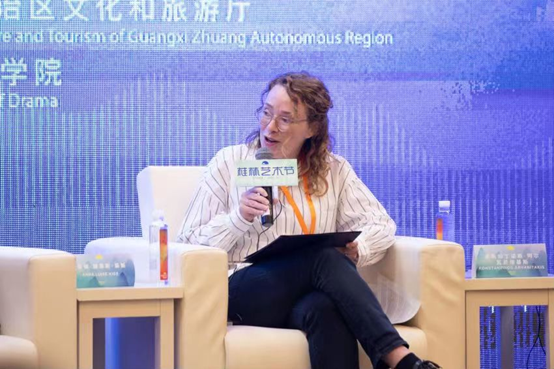
Dr. Anna Luise Kiss
Konstantinos Arvanitakis,Director of Athens Conservatoire Drama School from Greece, pointed out the role of theatre, “in a world that moves in dizzying speeds, it encourages slow thinking”. Theatre, he expressed, “offered a place for contemplation against the cacophony of angry voices,” that it was the “education of the soul”. He then moved on to elaborate on chorality, a key element in ancient Greek plays and a defining style of the production they brought to this year’s WTEA festival—they chose to approach the ‘Athens’ scene through chorality because it “brings to life the Athenian assembly.” Chorality sings out the essence of a play and voices the mind of humanity. In it lies the original intention and mission of ancient Greek national drama, the spiritual drive for the exploration of theatrical development today. According to Mr. Arvanitakis, the use of chorus in theatre also has an educational significance, “to validate the body politic, strengthen the sense of community and inspire togetherness.” He concluded by explaining how chorality showcased the philosophy of their school, “theatre is team work and requires total commitment. By plunging themselves into a native source, our students aim to create a single body which, with a single voice, carries time, space, humanness across the planet.”
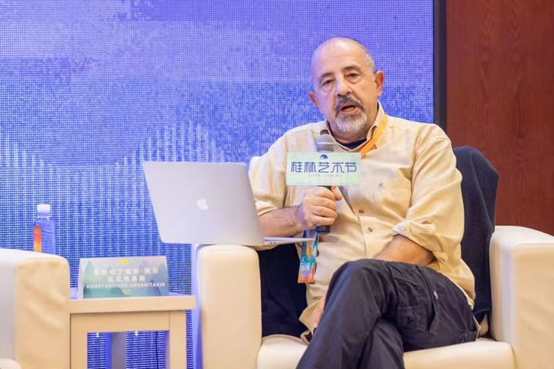
Director Konstantinos Arvanitakis
Ms. Irina Zhukova, Rector’s Advisor for International Projects at the Russian Institute of Theatre Arts (GITIS) from Russia, discussed how GITIS, based on the uniqueness of Russian culture, established an educational system for the new generation of actors. They have founded Centre for Studying the Stanislavski System and Theatre Pedagogy, the primary tasks of which include: 1. documenting the development of the Stanislavski system within the traditions of Russian theatre; 2. determining the standard teaching methods for acting, directing, and all practical disciplines, and transmitting them to professional and wider audiences; 3. exporting the Russian cultural code in the theory and practices of theatre art, presented by the masters, students, and graduates of GITIS. Meanwhile, GITIS engages in extensive collaboration with theatre schools from various countries. They continuously release academic publications, develop new educational projects, organize international theatre festivals, and conduct academic research and master classes. Ms. Zhukova emphasized that GITIS was dedicated to the ongoing education in the legacy of the Stanislavski System, continually spreading the unique teaching methods of Master Stanislavski, while providing students with opportunities to showcase their talents.
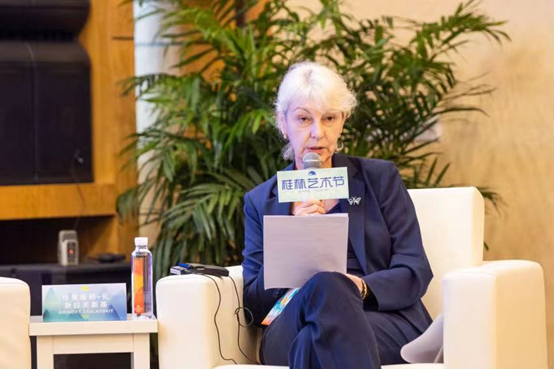
Ms. Irina Zhukova
Dr. Mark Parker,Dean of Schools of Music & Drama, Oklahoma City University from the USA, told the audience that “the greatest influence overall on American acting training has been Stanislavski”, based on which Lee Strasberg and Sanford Meisner had developed their own methods. In the exploration of a native school of acting, what should be put in the spotlight, he believed, was not only actor training itself, but also new demands for theatre education in society. As time changes, new training methods of drama actors are required, from undergraduate and postgraduate levels, to professional education. According to Mr. Parker, the undergraduate programs at Oklahoma City University aims to help students to lay a solid foundation for acting in theatre and film, while the postgraduate program places a greater emphasis on practical experience, with the first academic year in Los Angeles and the second in London. He explained that idea was that diverse teaching approaches could help students cultivate suitable skillset, develop good professional practice, and create more iconic roles with the primary goal of serving humanity through theatre art.
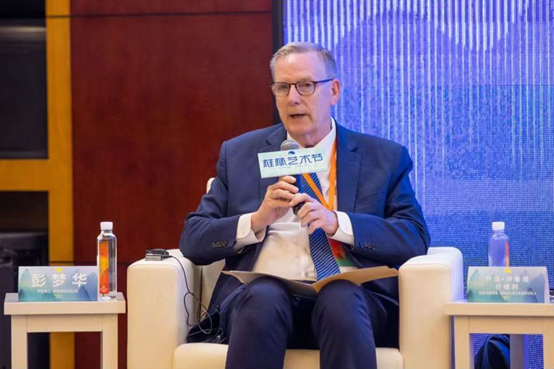
Dr. Mark Parker

Group Photo
Translated by Xiang Yueyi from the Chinese article in the CAD's official WeChat account: https://mp.weixin.qq.com/s/c21yCKiFRKtebSoZkQ_y1w.
